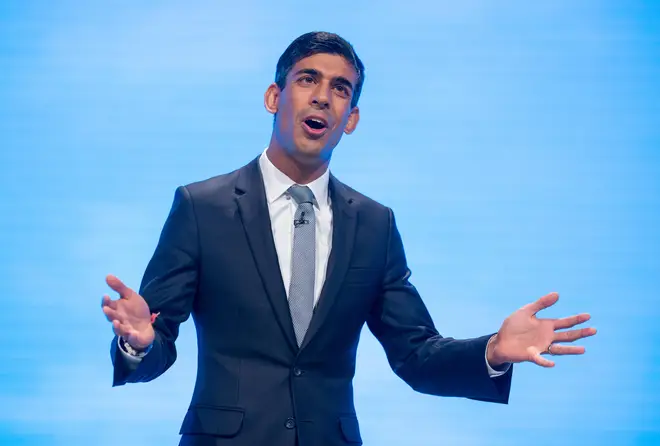
Lewis Goodall 10am - 12pm
18 May 2022, 19:35 | Updated: 18 May 2022, 20:54

'I don't believe a word of it'
Former Tory leader Sir Iain Duncan Smith "doesn't believe" Rishi Sunak's claim that old IT systems are to blame for not raising benefits.
Speaking on LBC's Tonight with Andrew Marr, Sir Iain called for the Chancellor to raise Universal Credit, criticising his claim that an old system used by the Department for Work and Pensions (DWP) was to blame for not doing so in the spring statement.
Asked by Andrew what he made of the Chancellor's "excuse", Sir Iain said: "I don't make anything of it at all, because it's not true. I don't believe a word of it.
"This is what officials pass you when you think that they don't want to do something.
"The truth is, Universal Credit is a cloud-based system, it's digital. If you want to do something with it you make the changes and alterations and you can do it. We managed to do it during the lockdown."
Watch Tonight with Andrew Marr exclusively on Global Player every Monday to Thursday from 6pm to 7pm.

Pressed on whether it was being used as an "excuse" by officials, Sir Iain said: "When people tell you they can't do it because of a technicality, my answer is sort the technicality out, but I don't necessarily think it's major at all. Pay the money."
The Chancellor has faced backlash for claiming he had discussed a higher rise than the 3.1 per cent given, but was told there could only be an uplift once a year for people on some benefits.
He acknowledged that his answer "sounds like an excuse" but insisted he had been "constrained somewhat by the operation of the welfare system".
Read more: Westminster sleaze: Drugs so common that MPs 'have been known to snort cocaine from desks'
Read more: Putin 'constantly surrounded by doctors' as illness throws Kremlin into chaos
"The operation of our welfare system is technically complicated," Mr Sunak told Bloomberg.
"It is not necessarily possible to [increase benefits] for everybody.
"Many of the systems are built so it can only be done once a year, and the decision was taken quite a while ago."
Shadow work and pensions secretary Jonathan Ashworth has labelled Mr Sunak's explanation for not raising benefits "pathetic".
He said the IT system "doesn't stop Rishi Sunak taking action to protect people from the cost of living Tsunami".
You can also listen to the podcast Tonight with Andrew Marr only on Global Player.
Yep and as I pointed out in the Commons yesterday the IT system doesn’t stop Rishi Sunak taking action to protect people from the cost of living Tsunami.
— Jonathan Ashworth (@JonAshworth) May 18, 2022
Ministers have chosen to impose severe real terms cuts to Universal Credit and pensions. https://t.co/JkMeBmeBPT
While Labour's deputy leader Angela Rayner accused the Chancellor of "insulting your intelligence".
Sir Iain told Andrew that "two elements" are necessary to help people out of the cost of living crisis in the UK.
"We now must lower tax on the squeezed middle, as they are already facing significant costs and they are struggling," he said.
"And at the lower end of the income scale, where taxation doesn't hit them because they are obviously out of tax half the time, the truth is you need to use Universal Credit, which I designed at the time to look like a tax position, and you start to inject some money into that, so they then find they are back to at least the level they need to pay their bills.
"Their biggest problem is food and heating, they spend more as a portion of their income on that, so they need to be covered by that. So Universal Credit needs to be raised."
A spokesman for the DWP previously told LBC: "Since 1987, we have consistently used September's inflation figure to make the decision on benefit uprating including in cases where benefits are increased beyond the rate of inflation at the point at which the rise kicks in, as happened in 2012, 2015 and 2020.
"However, we recognise the pressures on the cost of living and are taking targeted steps to help, including spending £22 billion across the next financial year to support people with energy bills and cut fuel duty.
"For the hardest hit, we're putting an average of £1,000 more per year into the pockets of working families on Universal Credit, have also boosted the minimum wage by more than £1,000 a year for full-time workers and our Household Support Fund is there to help with the cost of everyday essentials.
"Universal Credit is a dynamic system which adjusts as people earn more or less, and simplifies our safety net for those who cannot work.
"The six benefits it is replacing all have complex and inefficient paper-based systems that are slowed further by ageing, inflexible IT, taking several months to process changes that Universal Credit could make in weeks."